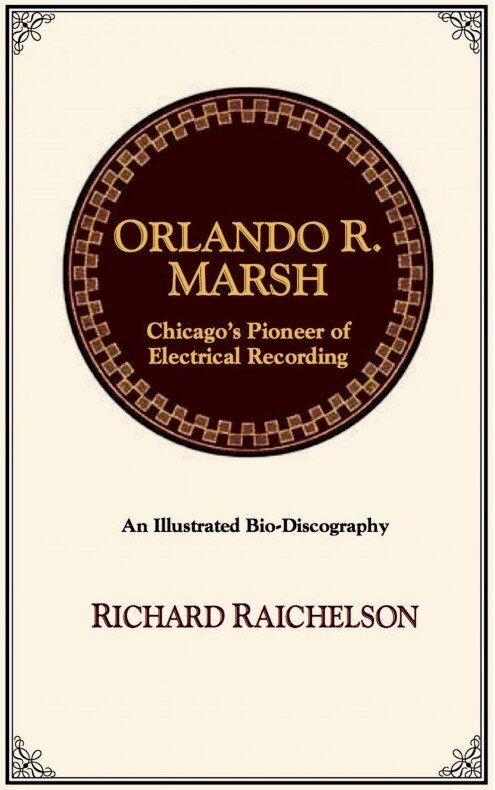 Though largely forgotten, today, Orlando Marsh was a highly-regarded pioneer in the development and use of electrical recording. Among other things—including contributions to sound-on-film technology—he is credited with several important innovations and inventions (some patented, many not) that helped the music industry transcend the limitations of acoustically recorded 78s. Marsh began his earliest experiments with recorded sound at Essanay Studios, in 1914, the same year the moving picture company famously signed Charlie Chaplin away from Keystone.
Though largely forgotten, today, Orlando Marsh was a highly-regarded pioneer in the development and use of electrical recording. Among other things—including contributions to sound-on-film technology—he is credited with several important innovations and inventions (some patented, many not) that helped the music industry transcend the limitations of acoustically recorded 78s. Marsh began his earliest experiments with recorded sound at Essanay Studios, in 1914, the same year the moving picture company famously signed Charlie Chaplin away from Keystone.
In 1921, Orlando Marsh became the first to use electrical recording to put music on disc—four years before the rest of the commercial recording industry began to adopt it. The technology, which Marsh pioneered, was used to make many early jazz and blues recordings, including several by Jelly Roll Morton, Joe “King” Oliver, Merritt Brunies and His Friar’s Inn Orchestra, Jimmy Blythe, Muggsy Spanier, and Blind Lemon Jefferson. In fact, Marsh was the first to record a number of artists, including Clarence M. Jones, Boyd Senter, and Willard Robison, whose early work would otherwise have been lost to obscurity..
Richard Raichelson’s book is a remarkable achievement that culminates 20+ years of research. Lushly illustrated with more than 160 images (most in color), the book is much more than your typical bio-discography. Bringing together everything that is known about the life and work of Orlando Marsh, Raichelson’s biography deftly intertwines the recording engineer’s personal life with his many achievements in sound reproduction. Though much of it is technical (as might be expected), all of it is easy to read.
Following the biography is a section about the production of Autograph and Electra Records, the two labels that Marsh produced. In addition to a discussion specific to these labels, the section includes one of the best written descriptions of the 78 production process in general, from wax master to finished disc. The third section of the book is a complete discography of Marsh matrices, which includes generous notes about the artists and the recording sessions. Completing the book are ten appendices, including an Index of Hallmarks and Labels Recorded by Marsh Laboratories, plus a glossary of terms. While obviously recommended for anyone interested in the history of the recording industry, Richard Raichelson’s book is also recommended for those interested in early radio broadcasting and the Chicago music scene of the 1920’s.
Orlando R. Marsh: Chicago’s Pioneer of Electrical Recording is Richard Raichelson’s third book. After getting his PhD, at the University of Pennsylvania, he was an assistant professor at the University of Memphis and Director of Education and Research at the Center for Southern Folklore, in Memphis. Raichelson is highly regarded for his work in jazz research. In addition to being the founder and producer of Arcadia Records, he is a founding member and past president of the International Association of Jazz Record Collectors, for which he co-edited the IAJRC Journal’s “Discographical Forum” (among other features and columns), for many years. He has also been a contributor to JEMF Quarterly, Vintage Jazz Mart, ARSC Journal, and Journal of American Folklore. In his spare time, Richard Raichelson plays jazz and ragtime piano.
Orlando R. Marsh: Chicago’s Pioneer of Electrical Recording is available at Nauck’s Vintage Records, 22004 Sherrod Lane, Spring, TX 77389. Or visit www.78rpm.com.
Orlando R. Marsh: Chicago’s Pioneer of Electrical Recording
(An Illustrated Bio-Discography)
by Richard Raichelson
Arcadia Records; 490 pages
ISBN: 978-0-9647545-3-9
Hardcover $95
Paperback $60
Write Jeff Hopkins at hop@collateralworks.com.




















